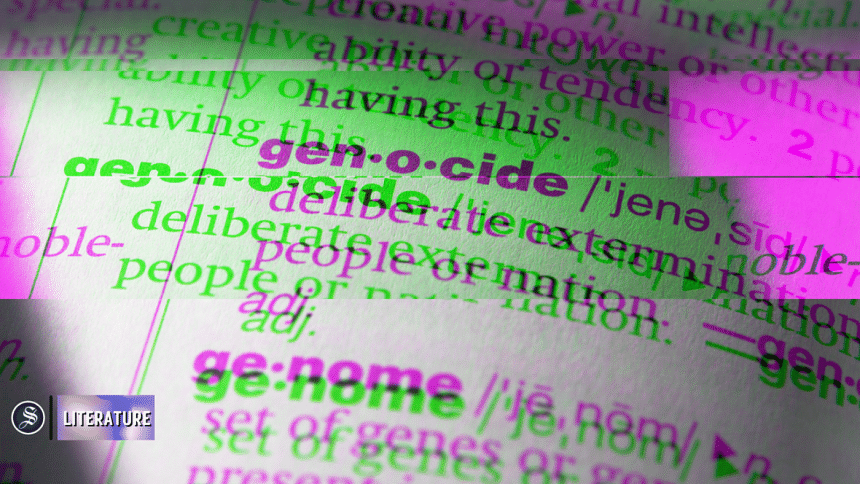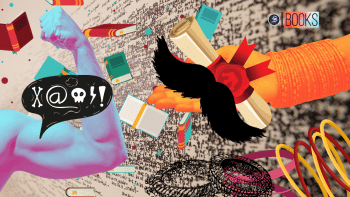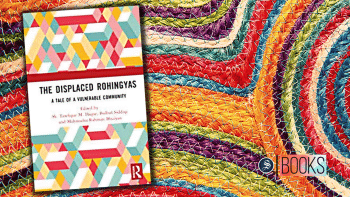Baby killed/baby found dead: On the use and abuse of language

For the past four months or so, my phone has turned into a window for at least one ongoing genocide, and news media across the world has found inventive new ways to sterilise the topic of murder, displacement, and occupation as if none of those were real words. Ruling powers, no matter where or when, have found ways to warp language to deviate from the truth—to hide atrocities under blanket statements and increasingly vague terminology. This is a truth that has existed for at least as long as history has existed—language as a device is subject to abuse as much as it is used. The question, then, is what the purpose of language even is if it isn't to express anger and love. What happens to language when sterile non-responses to atrocities take up so much of its breathing room?
Language, and the control of language, is integral in the struggle between oppressors and the oppressed. In Bangladesh, during the month of February, celebrating one's mother tongue becomes an overpowering emotion—language, and its importance once again takes the spotlight. With Ekushey comes Boi Mela and a renewed interest in Bangla literature. The history here is another vivid display of the bonds one can have with language and though my personal relationship with Bangla is strained—to say the least—it would be a lie to say that the celebration of language for itself is something that does not have an impact on me.
A word, a sentence, a phrase can instigate monumental changes—this is another truth of the power of languages. Yet, at the same time, so often does the idea of language feel like a feeble and fragile thing to me. In the onslaught of the horror that comes alongside waves of white and zionist propaganda online, the very idea of language—of a word—crumples inside my mouth.
But isn't that entirely the intention? Has it not always been this way? All throughout colonial history, those with power have always done the most to either silence or completely usurp language. With this comes the theft of identity and culture—and the complete removal of voices who want to scream against any of this. I would be lying if I said I understand the intricacy of abusing language in a colonial context, but in the past few months that has mattered less and less, I feel. World leaders have done nothing but use their platform to remind us how language, too, is a weapon in their hands. Starting with complete silence to refusing acknowledgment of any damage done—their language has spoken on their behalf.
But amidst all of this, there has also been a rise in collective anger. After all, for how long can we stand by and witness organisations beg for a "humanitarian pause"? What sort of pause would even be "humanitarian" when carpet bombing has already razed everything to the ground? What language can you use to respond to this? And to the politicians and their vetoes and dismissals of any proposals that might bring some change—what language do you use with them? What of their language that otherises an entire people to dehumanise them? In response to so much inhumanity in action and language, the outcry has also been through action and language. This isn't me trying to say that mere words and boycotts can fix the world, but there is a need for a sort of anger to be expressed through language, through all languages. If not, then would there be a point in me writing anything?
I think quite often of the poem "Post-Atrocity Statement" by Tishani Doshi (found on her Instagram) which came to light informed by these events. It is a haunting exhibition of the potency language can have when unchecked powers are allowed to turn dehumanising language into everyday diction—and I am reminded of just how commonplace that is. How often have we seen the usage of words like 'Upojati' as a slur—have seen language being used to otherise indigenous communities in our own country? In February, in the month of language, it is important to remember that the country, despite its name, does not belong to only one mother tongue. And none of that says anything about the rampant bigotry built into language from centuries of violence against peoples labelled as the 'other'.
All of these questions and more seep into my mind and remain there. Words still crumple in my mouth before I allow myself to speak and these questions, more often than not, remain as questions. But the one response I've found to all of these is the reminder that language in all of its complexity is perhaps our greatest invention. It is the way we understand each other, and this understanding is what will inevitably create communities. We as human beings are nothing if not communal, and all communities reserve the right to express love and anger in equal measures in their actions and, sometimes more importantly, in their language. This is the only truth behind language that makes any sense to me. Even should it achieve nothing, the very act of communication—not sterile words rehearsed and uttered—makes us more human every day.
Raian Abedin is a poet, a student of Biochemistry, and a contributor at The Daily Star.

 For all latest news, follow The Daily Star's Google News channel.
For all latest news, follow The Daily Star's Google News channel. 









Comments